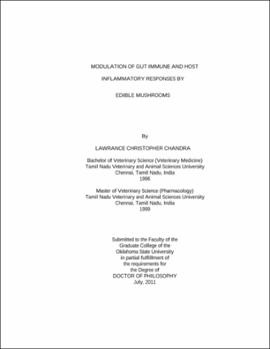| dc.contributor.advisor | Kuvibidila, Solo | |
| dc.contributor.author | Chandra, Lawrance Christopher | |
| dc.date.accessioned | 2013-11-26T08:26:18Z | |
| dc.date.available | 2013-11-26T08:26:18Z | |
| dc.date.issued | 2011-07 | |
| dc.identifier.uri | https://hdl.handle.net/11244/6856 | |
| dc.description.abstract | Scope and Method of Study: | |
| dc.description.abstract | The Gastro Intestinal (GI) tract represents the largest mucosal surface in the body responsible for digestion, absorption of essential nutrients and protection against various pathogens entering through GI tract. Dendritic cells (DCs) in the GI tract plays major role in gut immune response through capturing and transferring antigens to T-cells and releasing cytokines. Although several cytokines produced by DCs are involved in gut immunity, IL-23 is involved in the defense against most pathogens in the GI tract through up-regulation of defensins. Previous report from our lab showed that the extracts from edible mushroom enhance a-defensin production in in-vitro cell line The aim of this study was to investigate effect of white button (WM) and portabello (PM) mushrooms on IL-23 secretion both in-vitro and in-vivo models. We also assessed the side effects of these mushrooms by using histopathology. We used C57B6 mice for studying IL-23 secretion and toxicological evaluation. We used 3% DSS to induce acute inflammation because DSS induced inflammation is localized to the GI tract rather than systemic inflammatory response. Moreover, we are interested to study the effect of mushrooms on intestinal dendritic cell response. We also used J.744.1 a mouse monocytic cell line to study the molecular mechanism by which edible mushrooms up-regulate IL-23 secretion. We used spleen cell culture for ex-vivo cytokine secretion assay. Cytokines were measured by using ELISA. | |
| dc.description.abstract | Findings and Conclusions: | |
| dc.description.abstract | In DSS untreated mice, the plasma IL-23, IL-6 levels were low compared to DSS treated mice. All the mice fed with mushroom diets for six weeks showed an increase in the plasma IL-23, IL6, colon MPO, colon IL-6, and inflammation score when they challenged with 3% DSS. Although all mushroom up-regulates IL-23, PM up-regulates IL-23 secretion on the 3rd of day of in-vitro treatment and mice without DSS challenge unlike other mushrooms. Data suggest that mushroom consumption may increase gut immunity and provide resistance against certain pathogens through up-regulation of IL-23. These findings also suggest Dectin-1 receptor pathway is the major pathway in WBM and PM induced IL-23 production. Difference in the IL-23 secretion response among these mushrooms was observed. This difference could be due to their mechanism of action on Dectin-1 receptor. Similarly, mice fed the SM diet developed fatty liver unlike mice fed the AIN93 and WBM diets. This also suggests difference in the mechanism of action of these mushrooms in the development of fatty liver. | |
| dc.format | application/pdf | |
| dc.language | en_US | |
| dc.rights | Copyright is held by the author who has granted the Oklahoma State University Library the non-exclusive right to share this material in its institutional repository. Contact Digital Library Services at lib-dls@okstate.edu or 405-744-9161 for the permission policy on the use, reproduction or distribution of this material. | |
| dc.title | Modulation of gut immune and host inflammatory responses by edible mushrooms | |
| dc.contributor.committeeMember | Smith, Brenda J. | |
| dc.contributor.committeeMember | Clarke, Stephen L. | |
| dc.contributor.committeeMember | Do'ffay, M Jean | |
| dc.contributor.committeeMember | Marlow, Denver | |
| osu.filename | Chandra_okstate_0664D_11541.pdf | |
| osu.accesstype | Open Access | |
| dc.type.genre | Dissertation | |
| dc.type.material | Text | |
| dc.subject.keywords | colitis | |
| dc.subject.keywords | edible mushrooms | |
| dc.subject.keywords | fatty liver | |
| dc.subject.keywords | gut immunity | |
| dc.subject.keywords | il-23 | |
| dc.subject.keywords | il-6 | |
| thesis.degree.discipline | Nutritional Sciences | |
| thesis.degree.grantor | Oklahoma State University | |
